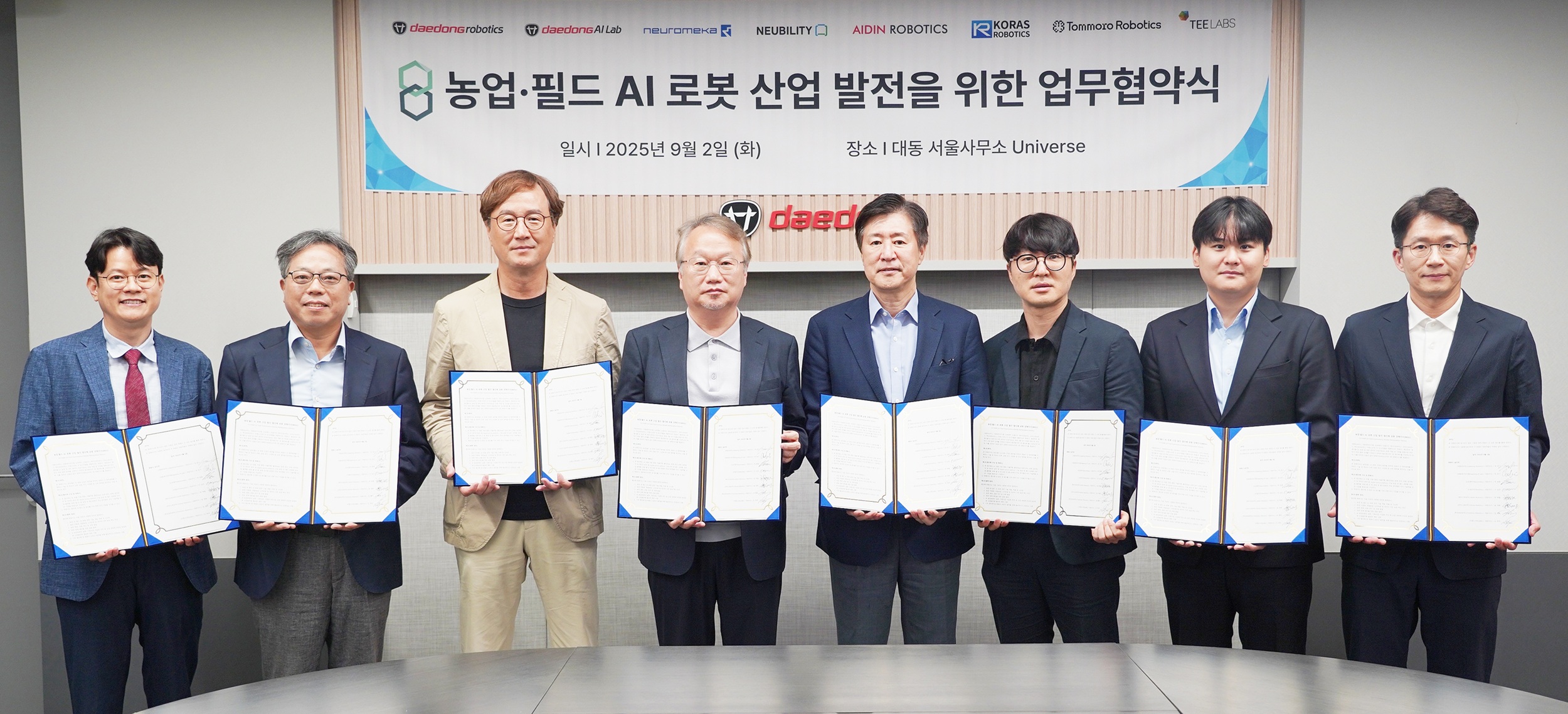Daedong Group Launches Council to Strengthen Competitiveness in Agricultural and Field AI Robotics
“Eight AI and Robotics Companies Join Forces”
Daedong Group Launches Council to Strengthen Competitiveness in Agricultural and Field AI Robotics
-. Daedong Robotics and partner firms collaborate to advance AI robotics for agriculture and field operations
-. Member companies share expertise in AI and robotics, pursue joint research, and propose policy and commercialization initiatives
-. The council is expected to mark a turning point for Korea’s AI robotics industry and drive a new model of industrial collaboration
Daedong Group’s AI robotics subsidiary Daedong Robotics (Co-CEOs Won Yu-hyun and Yuh Jun-goo) and its AI robotics software subsidiary Daedong AI Lab (CEO Choi Joon-gi) announced on September 4, 2025, that they held an inaugural ceremony for the “Agriculture and Field AI Robotics Industry Development Council” (hereinafter “council”) at Daedong’s Seoul office on September 2. During the event, the participating companies signed a Memorandum of Understanding to strengthen industrial competitiveness through collaboration.

The new council brings together eight companies: Daedong Robotics, Daedong AI Lab, Neuromeka, Neubility, Aidin Robotics, KORAS Robotics, Tomorrow Robotics, and Tee Labs. The member companies will share their core technologies, ranging from AI model development, autonomous driving and mapping, fleet management, monitoring and remote control, and data analytics, to digital service platforms, mobile platforms for agricultural and field robots, and robotic arms and hands. They also plan to carry out joint research and commercialization projects.
Daedong Group, with Daedong Robotics and Daedong AI Lab at its center, has been accelerating the development of agricultural and field AI robots. This year, the group introduced a voice-recognition transport robot with autonomous driving capabilities and announced its vision for three major AI technologies for agriculture. The companies are developing advanced technologies such as a VLM-based work-recognition and human-interaction robot trained on multimodal data including voice and video, an autonomous mobility platform capable of stable operation in complex open-field environments, and a software platform that integrates key functions such as AI modeling, SLAM, FMS, and physical AI for agricultural applications. Daedong Group plans to use the council as a platform to strengthen its competitiveness in areas that require external collaboration, such as robotic arms and hands used in agricultural and field AI robots. The group also aims to accelerate the integration of advanced technologies and further enhance its core capabilities in AI robotics.
The council will work together on AI robot technology development, agricultural automation, precision agriculture, and smart farming. It will continue strategic partnerships that focus on advancing the AI robotics industry and building a stronger industrial ecosystem. Member companies will also explore policy proposals for industry standardization, identify joint research projects, and create commercialization models that can strengthen the global competitiveness of Korea’s robotics industry. The council plans to remain flexible and will continue to discover new opportunities to expand the scope of cooperation whenever necessary.
The launch of this council marks an important turning point for Korea’s robotics industry as it begins to expand into real-world applications. It is expected to drive transformation in the agricultural and field robotics sector through the use of physical AI technology. The collaboration between mid-sized companies and startups is expected to make it possible to develop complex technologies and carry out large-scale projects that would be difficult for a single company to manage alone.
This initiative is also expected to provide practical solutions for automation and efficiency in Korea’s agricultural sector, which faces ongoing challenges such as aging population, labor shortages, and climate change. It will contribute to the creation of a more sustainable agricultural ecosystem. Next-generation technologies such as precision agriculture, autonomous agricultural robots, and harvesting robots are already attracting global attention. The council’s collective technological capabilities are expected to create new opportunities for entry into international markets.
Meanwhile, Daedong Robotics entered the robotics market earlier this year with the launch of its transport robot. In July, it introduced a new model equipped with autonomous driving capabilities, becoming the first in the industry to receive government certification. Based on this achievement, the company recently completed a proof-of-concept at a Spanish farm in collaboration with a global enterprise that operates the world’s largest berry farms. It is now in discussions for further cooperation. Daedong Robotics is also developing several AI-based robots that feature voice-recognition control and functions for spraying and weeding, with the goal of launching them in 2026. The company has also begun joint development of a golf course divot repair robot with HL Group.
